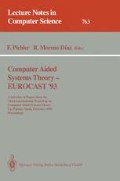Abstract
The aim of the paper is to provide an overview of various alternatives to consistency-based diagnostic reasoning and to pinpoint their relationship with General Systems Theory (GST). The inconsistencies between the observations of the system to be diagnosed and predictions provided by its model are used to calculate all possible culprits, i.e. to diagnose the system. It is demonstrated that different variations of the basic diagnostic problem are defined by the choice of the epistemological level of the system and the model. Proposing the most informative next measurement is an important part of diagnosis. The paper also indicates how the techniques of model-based diagnosis can be applied to program debugging.
This research is a part of the Vital project which is partially funded by the ESPRIT Program of the Commission of the European Communities, as project 5365. The partners in the Vital project are: Syseca Temps Reel (F), Bull Cediag (F), Onera (F), The Open University (UK), University of Nottingham (UK), Royal PTT Netherlands (NL), Nokia (SF), University of Helsinki (SF), and Andersen Consulting (E).
Preview
Unable to display preview. Download preview PDF.
References
Crow J. and Rushby J.: Model-based Reconfiguration: Towards an Integration with Diagnosis, Proceedings of the AAAI 91, Vol. 2, pp. 836–841
de Kleer J.: An Assumption-based TMS, Artificial Intelligence 28, 1986, pp. 127–162
de Kleer J. and Williams B.C.: Diagnosing Multiple Faults, Artificial Intelligence 32 (1987), pp. 97–130
de Kleer J.: Using Crude Probability Estimates to Guide Diagnosis, Artificial Intelligence 45 (1990), pp. 381–391
de Kleer J., Mackworth A.K. and Reiter R.: Characterizing diagnoses and systems, Artificial Intelligence 56 (1992), pp. 197–222
Domingue J., Motta E. and Watt S.: The Emerging Vital Workbench, to appear in Proceedings of the European Knowledge Acquisition Workshop (EKAW'93).
Eisenstadt M., Price B.A., and Domingue J.: Software Visualization as a Pedagogical Tool, to appear in Instructional Science, also Technical Report 93, HCRL, The Open University, November 1992
Friedrich G., Gottlob G. and Nejdl W.: Physical Impossibility Instead of Fault Models, AAAI 90, Boston, MA, 1990
Freiteag H.: A Generic Measurement Proposer, in Expert Systems in Engineering — Principles and Applications, International Workshop, Vienna, Austria, September 24–26, 1990, Lecture Notes in AI 462, Springer-Verlag, 1990, pp. 79–89
Klir G.J.: Architecture of Systems Problem Solving, Plenum Press, New York, 1985
Korel B.: PELAS — Program Error-Locating Assistant System, IEEE Trans. on Software Engineering, Vol 14, No. 9, September 1988
Kuper R.I.: Dependency-Directed Localization of Software Bugs, TR 1053, MIT AI Laboratory, May 1989
Reiter R.: A Theory of Diagnosis from First Principles, Artificial Intelligence 32, 1987, pp. 57–95
Struss P. and Dressler O.: Physical Negation — Integrating Fault Models into General Diagnostic Engine, in Proceedings IJCAI-89, Detroit, Vol.2, 1989, pp.1318–1323
Zdrahal Z.: Using Candidate Space Structure to Propose the Next Measurement in Model Based Diagnosis, to be published in Proceedings of DEXA 93 conference, Prague, 6–8 September 1993, Springer-Verlag
Zeigler B.P.: System Formulation of a Theory of Diagnosis from First Principles, IEEE Trans. on Reliability, Vol 41, No. 1, 1992
Author information
Authors and Affiliations
Editor information
Rights and permissions
Copyright information
© 1994 Springer-Verlag Berlin Heidelberg
About this paper
Cite this paper
Zdráhal, Z. (1994). General systems theory as a framework for model-based diagnosis. In: Pichler, F., Moreno Díaz, R. (eds) Computer Aided Systems Theory — EUROCAST '93. EUROCAST 1993. Lecture Notes in Computer Science, vol 763. Springer, Berlin, Heidelberg. https://doi.org/10.1007/3-540-57601-0_65
Download citation
DOI: https://doi.org/10.1007/3-540-57601-0_65
Published:
Publisher Name: Springer, Berlin, Heidelberg
Print ISBN: 978-3-540-57601-3
Online ISBN: 978-3-540-48286-4
eBook Packages: Springer Book Archive

